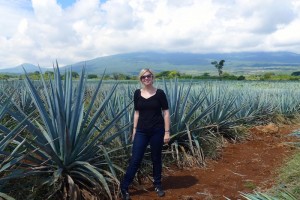“Five Questions With…” will be a monthly feature on our blog that profiles a member of the UVM history department. To request a profile of a particular history department professor or staff member, or to submit questions for consideration for particular professors, please email history@uvm.edu with the subject line “Five Questions.”
This month, we are chatting with Assistant Professor Sarah Osten. Professor Osten came to UVM last fall. Previously, she was a postdoctoral fellow and then a visiting assistant professor at Northwestern University in Evanston, IL. She earned her PhD from the University of Chicago in 2010. She is originally from the Boston area.
What made you want to become an historian?
I’ve always been really interested in history from the time I was very young, but it took me a while to decide to pursue history as a career. My original plan after college was to go to graduate school in law or political science, focusing on Latin America. But over time, I realized that the questions that most interested me about politics were almost always historical ones, and that historians had written most of my favorite books about Latin America. I also discovered that I love doing archival research.
Why Mexican history? What is your connection to Mexico?
I studied abroad in Puebla, Mexico as an undergraduate and I’ve been smitten and fascinated with Mexico from that point onward. Mexico is not my own country, but in many ways it has become a second home to me over the years. Aside from my personal connection to Mexico and my own passion for Mexican history, I think it’s really important for more people in the US to learn more about Mexico (and Latin America in general), and I hope that I can contribute to that in some small way with my teaching and research.
What’s the most exciting part of your current research, for you?
I am really lucky to be working with the personal papers of many of the Mexican politicians from the 1910s and 1920s that I study. What that means in practice is that I spend a lot of my time reading other people’s mail from almost a century ago. Mostly their letters are about politics during and after the Mexican Revolution, but in many cases, they also include details about their spouses, their kids, their friends. In one case, I even found out about a secret love affair. Most of that kind of personal detail won’t make it into the book I’m writing about Mexican politics in the 1920s, but these documents help me to understand who these people were and why they did some of the things they did. More importantly for writing a political history of the period, I can also track these politicians’ relationships to each other over the years.
What’s your favorite thing about teaching history?
Latin American history is something that many of my students have never studied in any depth, or at all, before they first arrive in my classroom. I really enjoy introducing students to the history of the region, and helping them to connect the dots in terms of where Latin America fits (and doesn’t fit) in their understandings of global history and politics. I also really enjoy working with students who embark on their own research projects on Latin American topics. And I am always thrilled when students go on to travel or study abroad in Latin America after taking courses with me.
What are you up to when you’re not on campus?
Weather permitting, I try to take a run along the lakefront three or four times a week. I’ve also been spending a lot of time lately engaged in an epic battle against the weeds in my garden. So far, the weeds are winning.

